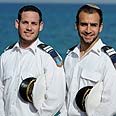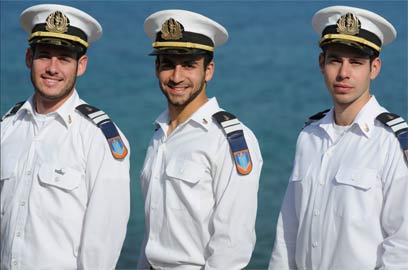
Being religious in Navy
Three young national religious men who chose prolonged military service in Israeli Navy over traditional Torah study tell Ynet about challenges. 'We don't have an agenda, we are just highly motivated,' one officer says
Most of their classmates from the Maale Gilboa Yeshiva chose the 'integrated route,' which allows them to complete three years of military service in two parts, broken up by a two-year break for Torah study. Others chose the 'Hesder' route, which allows them to combine a shorter, 16-month military service with a longer Torah study period.
But these three young men chose the more difficult route: Upon enlisting in the IDF, they committed to seven years and four months of service at an army branch that is yet to win the fame that it deserves within the religious public.

Highly motivated. Friedlander, Wolbromsky and Shauloff
Adiel Shauloff, 21, a Jerusalem resident, agrees that skullcaps and white uniforms are a rare combination, and explains that there are difficulties in marketing Navy service to the national religious youth.
"The Navy is smaller," he explains. "The operations are sometimes conducted at faraway and classified destinations, and everything is kept under wraps for obvious reasons. We can hardly make anything public."
Regardless, Shauloff has trouble concealing his pride. "The service here is very difficult and it's incomparable to what is going on with any of my friends," he says. "There is a mental difficulty as well, and a religious challenge that they don't encounter at the 'green' units. Life there is easier."
The fresh Navy officer notes, however, that considerably more religious recruits now choose to serve in the Navy, mostly because "a friend brings a friend." Moreover, he claims that everyone is now more aware of the significance of positions in the Navy, the contribution and the operational level.
Challenge beyond halacha
Various Jewish law issues are raised aboard the 60-meter ship, upon which the soldiers often find themselves confined for an entire week.
Amiad Wolbromsky, 23, a Gush Etzion resident, lists observance of kosher rules and Shabbat as some of the more prominent challenges, but notes that sharing cramped living quarters with dozens of soldiers obligates everyone, both religious and secular, to be especially sensitive to each other's requirements.
"Suddenly everyone knows that in the army, cutlery with a hole in it is for dairy and without a hole is for meat, and that if they are mixed, it will make it problematic for us to eat," he says.
Neil Friedlander, 21, also from Jerusalem, adds that the complexity of being a religious Navy officer goes beyond Jewish law.
"What is unique to the naval officers in this course is the challenge that is not just limited to kosher food, the kitchen and Shabbat – but also raises the question, how do you bring the religious person in you into the position without pushing an agenda and distancing yourself from others," he says. "As commanders we want to be leaders and educating figures."
Shauloff claims that they have achieved this goal. "Every Friday night the course trainees sing holy songs, soul songs," he says.
Religious and secular worlds merge
Explaining how the yeshiva at Kibbutz Maale Gilboa gave rise to three Navy officers, Wolbromsky says that the education they got put major emphasis on integrating religious life with Israeli life.
"It's important to study Torah on a high level without taking away from military service," he says. "Not to be afraid of becoming religiously weaker in the army, but to contribute and bring the Torah with us."
Shauloff notes that while this first major exposure to secular society does pose challenges, eventually it should not influence faith. "There is a very natural curiosity that makes you think a lot, but in the end it causes mutual growth," he says. "You discover a secular world different from what you expected: Wonderful, moral, not vilified. All in all, they are a lot like us."
With that, there is no doubt that the presence of fellow skullcap-wearers made each of their lives easier. "Our closeness, the shared roots and the mutual aid are unparalleled," Shauloff says. "The morals of religious Zionism, which we have absorbed at home, brought us closer together."
'This is not sacrifice'
Though on average religious individuals get married younger than seculars, the three brand new Navy officers are not worried that they will find themselves without a match because of their lengthy, seven-year commitment to the IDF.
"Actually, it brings us terrific set-ups," Wolbromsky jokes. "Anyone who wants can go on dates, and it's relatively comfortable. We are stationed in Haifa, in the city, and not at some hole in the Negev like many other soldiers."
"Life is short, it's true, but we must remember that we will finish our service at the age of 25-26, and that's not too late to get married," Friedlander adds. "We don't see in this a sacrifice but a perfect balance between Torah study and work. It's not like were wasting seven years on some trip to Thailand."
The relatively large number of national religious soldiers in officer positions is well known, and now the three Navy officers are part of the statistic. Shauloff notes that this is all a product of education.
"In my class, there isn't one person who didn't go for combat service, and many of us chose elite units and went for officer positions," he says. "This public carries on its shoulders a large load of the military service. We make for high quality manpower."
'We don't have agenda'
When reminded that some sectors of society fear what is dubbed the "knitted skullcap takeover" of the IDF, they respond dismissively.
"If it wasn't for the religious people, the army would not be what it is today," Shauloff says. "Anyone who does not want to see them there probably does not send his children to the same units."
"We are not some gang with a shared agenda," Friedlander adds. "They mistakenly think that we hold the same political views, which is apparently more important to us than religion. We are just highly motivated."
"We enlisted as individuals, not as religious people," Wolbromsky reiterates. "The fear comes from ignorance."
The big question, which seems to be what scares those sectors worried about the multitude of the religious in the army, is what happens when a military order goes against Jewish law – when the rabbi disagrees with the commander.
"When an order arrives, you obey it without thinking, because when it arrives, it is only for the purpose of an operation," Shauloff says.
Wolbromsky, on the other hand, makes the distinction between the orders that must be obeyed at once and those that leave room for contemplation.
"An operational order that must be instantaneous, for example when a life is at stake, I have no doubt that I would obey it immediately," he says. "But if a commander orders to cook warm food on Saturday, like what happened to my friend – we can talk about it, see where it comes from."
- Follow Ynetnews on Facebook










